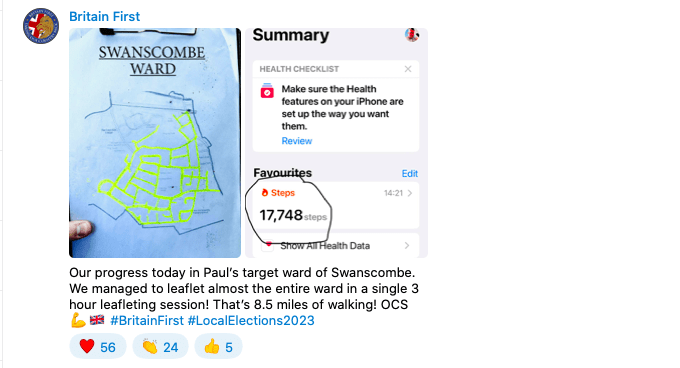HOPE not hate uses cookies to collect information and give you a more personalised experience on our site. You can find more information in our privacy policy. To agree to this, please click accept.
The 2023 Local Elections marked the latest in a long line of declining results of the far right. In our pre-election blog we noted that there was a slight uptick in the number of candidates put forward by radical-right parties like Reform UK, UKIP and the Heritage Party this year, which perhaps reflected a belief that the political winds were in their favour. We also noted the energy with which more extreme groups like Britain First and the British Democrats were putting into their handful of target wards.
It was therefore satisfying to watch these hopes crash onto the rocks of reality, as candidate after candidate recorded miserable showings in their chosen wards. Even the Lancashire-based fascist magazine Heritage & Destiny was damning in its analysis:
“Last week’s elections were appalling. They reflected years of decline, years of factional division, years of vanity, years of crank obsessions, years of tolerating substandard conduct within our ranks.”
Never one to accept defeat with good grace, Britain First’s leader Paul Golding spent the days following the election coming up with reasons to celebrate each candidate’s disappointing results.
Golding himself came last in his target ward of Swanscombe, Dartford, with just 5% of the vote. He quickly proclaimed that, despite the evidence, his candidacy had merely been a “paper candidacy” to distract attention from their real target wards of Darenth (Dartford) and Hockley and Ashingdon (Rochford).

But his candidates fared little better in those places – Nick Scanlon also came last on 10% in Darenth ward, while Paul Harding came third in Hockley & Ashingdon with 13%. In both cases the BF candidate was defeated by a local independent candidate.
Golding’s decision to stand in Dartford might turn out to be a particularly costly error; HOPE not hate revealed last week that he potentially committed serious violations of electoral law by falsely listing a Dartford address in his submission to the Electoral Registration Officer and in his council nomination papers.
As expected, it was BF’s Deputy Leader Ashlea Simon who performed best, coming second in Walkden North (Salford) with 405 votes. However, the result will come as a major disappointment to the party; Simon’s vote actually went down from last year, both in raw numbers and vote share, despite six months of intense campaigning.
Facing a similarly dismal set of results, the British Democrats, a British National Party (BNP) splinter group, showed that having relevant political experience does not necessarily make the far-right any more palatable to voters. In Wyke (Bradford), leader Jim Lewthwaite received just 140 votes (5%) in a ward that he had previously been elected under the banner of the BNP in the mid-2000s, down from 700 votes (25%) in 2019 and 214 votes in 2022.
A bigger sting is the loss of the British Democrats’ only serving councillor, Julian Leppert, who was defeated in Waltham Abbey Paternoster ward (Epping Forest). Leppert was elected as a candidate for the anti-Muslim party For Britain in 2019 with 41% of the vote, before moving over to the British Democrats after the former’s collapse in July last year. This year’s election saw his vote share tumble to 25%, beaten to third place behind Labour and the Conservatives.

The English Democrats’ leader Robin Tilbrook, who had enlisted the support of activists from fascist Patriotic Alternative (PA) group to canvas for him, came a distant third in Shelley ward, Epping Forest.
Another candidate who campaigned with support of PA, the independent David Hyden-Milakovic, came last with 6% of the vote in his ward of Cannock South.
Perhaps the most disappointing night of all goes to Reform UK, however, who have been the subject of much speculation regarding their prospects of hoovering up the disaffected Tory vote in much the same way as the Brexit Party and UKIP did in 2019 and 2015 respectively.
The party fielded 475 candidates, with at least one candidate in most council areas and a few in which they fielded a full slate. However, the party won just 6 seats in two wards in Derby and averaged 6% in the seats it fought nationwide. The seats it held were also fought under the banner of Reform Derby, a local franchise made up of former UKIP councillors who use their own branding, so cannot be taken as an endorsement of the wider party’s national strategy.

Reform UK leader Richard Tice excused his party’s performance by saying that “Rome was not built in a day. We’re a new party”, despite the fact that Reform UK is a continuation of the Brexit Party and achieved much better results at the European Elections in April 2019 – just a few months after its launch – than it does today.
UKIP, Heritage Party and the Alliance for Democracy and Freedom fared no better, with miserable results across the board. UKIP in particular had a bad night, with the loss of their few remaining district councillors bringing a final death knell to its presence on the British political scene.
The far right’s continued failure at the ballot box has varied causes. The Conservative Party has since 2015 been successfully drawing support and energy away from the traditional far right, first by offering a referendum on Brexit and then promising to implement a hard version of the result, and more latterly by adopting extreme policies like the Rwanda scheme and using inflammatory rhetoric over immigration and asylum seekers.
However, this rhetoric on asylum and immigration has not been matched by any fall in net migration or channel crossings, so the fact that parties ostensibly to the right of the Conservatives have been unable to win back even a fraction of those who previously voted for UKIP or the BNP remains a damning indictment of today’s far right efforts.
The smaller parties often paint their electoral setbacks as being the result of competing against the resources and media dominance of the major parties, but this narrative is undermined by the performance of Independent and Residents’ Association candidates, almost 1,000 of whom were elected this year despite facing similar challenges.
As the next General Election draws near, we can hope that the far right will continue to drift along its current course of incompetence, infighting and irrelevance.

HOPE not hate reveals two more extremist candidates from Reform UK, in the latest of a string of embarrassments for the party UPDATE: Just hours…